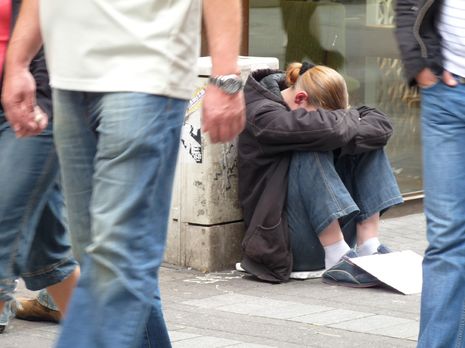Women accessing support services in Cambridge increases during pandemic
Domestic violence and homeless charities are reporting an increase in demand for their services as a result of national lockdowns

Charities across Cambridge have seen a significant increase in women accessing their services during the Covid-19 pandemic.
Cambridge-based homeless charity Wintercomfort is among those experiencing a rise in interactions with vulnerable women.
Melody Brooker, Wintercomfort’s Fundraising and Communications Manager, told Varsity that 85 women used their services between March and November last year, representing a moderate increase on the 71 women who accessed support in the same period in 2019. Significantly, the total number of interactions with these women nearly tripled: there were 1630 such interactions in 2020, compared with only 558 in 2019.
Brooker said that around half of the women supported by Wintercomfort are at risk of sexual abuse, and that the charity is looking to appoint a second project worker for women.
Meanwhile, a spokesperson for Cambridgeshire and Peterborough Domestic Abuse and Sexual Violence Partnership told Varsity that there was an increase in referrals to their Independent Domestic Violence Advisory Service between April and June, which they pointed out roughly corresponded to the first lockdown that began in late March. They explained that numbers returned to “near normal” when lockdown was eased over the summer, and that data for the winter is not yet available.
This comes as evidence from the Office for National Statistics suggests that lockdown has not necessarily led to a large increase in the number of people experiencing abuse or violence, but rather “an increase in the severity of abuse being experienced, and a lack of available coping mechanisms such as the ability to leave the home to escape the abuse, or attend counselling.”
In the first weeks of lockdown, the charity Shelter reported a 25% increase in calls and online interactions.
Social distancing has forced charities to offer digital services, which has had major impacts on how vulnerable women receive support.
Brooker said that staff at Wintercomfort handed out tablets and phones to service users in 2020, and that this had a salutary impact on the quality of interactions between staff and the women they help.
She said that women were “much more willing to engage” when they didn’t have to enter the support centre to access services, as shelters are often “male-dominated” environments. One estimation from 2017 found that women comprise only 14% of the UK’s homeless population.
In November, Cambridge City Council committed to extending additional support for homeless people in Cambridge until April 2021, measures which were first introduced with the onset of the March 2020 lockdown when the Council enabled 140 rough sleepers to isolate in emergency accommodation.
However, Brooker explained that the facilities were not separated by gender, which "can be challenging if there are women at risk of domestic abuse from other service users who might be in the same space.”
She added that while it is hard to get everything right during a national emergency – she gave the further example of sanitary bins initially not being provided as part of the Council’s emergency accommodation scheme – the priority is to ensure that people have the opportunity to seek shelter as soon as possible.
“We have an obligation as a city collectively to get people off the streets because of Covid, and we don’t have the luxury of numerous accommodation settings [...] We’re all in this together, and that’s tough.”
Over the summer, St. Catharine’s College worked with Cambridge Women's Aid to provide shelter for 23 women and children in empty accommodation blocks. One woman who was provided shelter said at the time: “I can’t find the words to explain what it has meant to me and my daughter, and the psychological safety it has offered us.”
While social distancing and the return of students limits the support that can be given by colleges, new initiatives have emerged during the pandemic to provide support for Cambridge’s at-risk population.
Cambridge Community Kitchen, established in November 2020, cooks free meals for delivery or collection in Cambridge, and recently reached capacity for the number of meals it is able to provide. A spokesperson told Varsity that they aim to increase capacity in the coming weeks, “and we suspect that the demand will rise to meet it.”
Nationally, funding for shelters has come under pressure since the government closed its ‘Everyone In’ policy in May. The scheme helped 15,000 homeless people into emergency accommodation during the pandemic, and there are fresh calls for it to be restarted given the winter weather and the national lockdown that began in December.
Prior to the pandemic, the plight of vulnerable women in Cambridge was highlighted on Christmas Eve 2019 when a homeless woman gave birth to twins outside of Trinity College, with a subsequent crowdfunding effort on her behalf raising £25,000.
Their precarious situation was further highlighted by the threatened closure in May 2019 of Whitworth House, a hostel for young women which opened in Cambridge in 1998. Funding was later provided to keep it open for at least 18 further months and it remains open today.
 Interviews / Lord Leggatt on becoming a Supreme Court Justice21 January 2026
Interviews / Lord Leggatt on becoming a Supreme Court Justice21 January 2026 Features / Are you more yourself at Cambridge or away from it? 27 January 2026
Features / Are you more yourself at Cambridge or away from it? 27 January 2026 News / Reform candidate retracts claim of being Cambridge alum 26 January 2026
News / Reform candidate retracts claim of being Cambridge alum 26 January 2026 News / Report suggests Cambridge the hardest place to get a first in the country23 January 2026
News / Report suggests Cambridge the hardest place to get a first in the country23 January 2026 News / Cambridge psychologist to co-lead study on the impact of social media on adolescent mental health26 January 2026
News / Cambridge psychologist to co-lead study on the impact of social media on adolescent mental health26 January 2026










